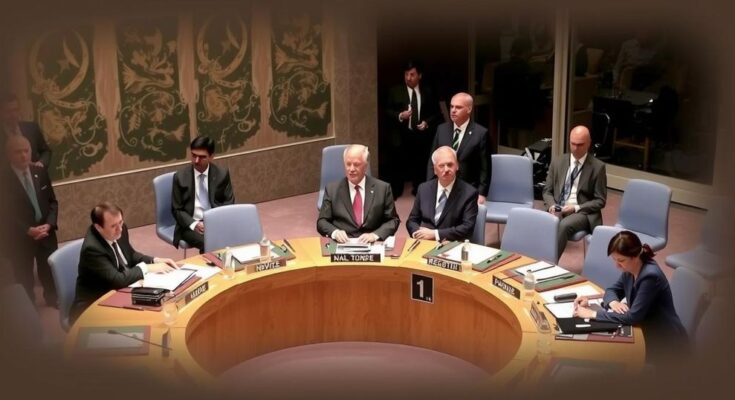Pakistan has begun a two-year term as a non-permanent member of the UN Security Council, replacing Japan. The country aims to use its position to address security concerns, especially concerning terrorism from Afghanistan, while also advocating for issues related to Kashmir. This is Pakistan’s eighth term on the council, granting it a greater role in shaping international discussions on terrorism and security threats.
Pakistan has officially commenced its two-year tenure as a non-permanent member of the United Nations Security Council (UNSC). Elected in June of the previous year to represent the Asia-Pacific region, Pakistan succeeded Japan and began its work on January 1, 2024. During a ceremonial event on January 2, the UNSC raised the flags of the new members, including Pakistan, Denmark, Greece, Somalia, and Panama, marking the beginning of their terms.
As reported by Pakistan’s Dawn newspaper, this marks the eighth instance of Pakistan’s membership on the council. Notably, through its position, Pakistan will also participate in the Islamic State (IS) and Al-Qaeda Sanctions Committee, which is tasked with identifying terrorism-linked individuals and groups and enforcing relevant sanctions. This opportunity allows Pakistan to shed light on cross-border terrorist incursions from Afghanistan by factions connected to IS and Al-Qaeda.
Moreover, membership in the UNSC will afford Pakistan increased leverage in shaping the agenda and advocating for proposals that highlight the terrorism threat emanating from Afghanistan, particularly concerning the Tehreek-e-Taliban Pakistan. It is also anticipated that Pakistan may use this platform to call attention to issues related to India’s sovereignty over Jammu and Kashmir and press the Afghan Taliban regarding regional stability. Pakistan’s term on the Security Council will conclude on December 31, 2026.
Pakistan’s inclusion as a non-permanent member of the United Nations Security Council comes at a time when the region experiences complex geopolitical challenges. The UNSC is the principal organ responsible for maintaining international peace and security, making Pakistan’s role crucial as it contends with ongoing militant threats. Historically, Pakistan’s involvement in the Security Council has enabled it to address its security concerns and assert its position within international discussions on terror-related challenges, particularly regarding groups like IS and Al-Qaeda. This latest membership presents Pakistan with a significant chance to influence global discussions around terrorism, especially in relation to regional dynamics involving Afghanistan and India.
In summary, Pakistan’s two-year term as a non-permanent member of the United Nations Security Council represents an important opportunity for the nation to address critical security issues on the international stage. With the power to influence deliberations and propose measures, Pakistan intends to bring attention to the threats it faces from terrorist groups operating out of Afghanistan and to advocate for its territorial integrity regarding Jammu and Kashmir. As the term progresses, Pakistan’s actions on the council will be closely observed by regional and global stakeholders.
Original Source: www.afintl.com




